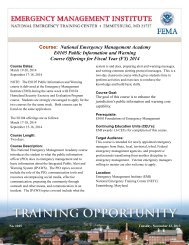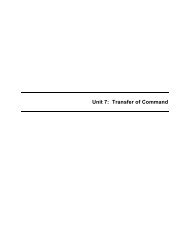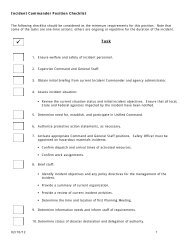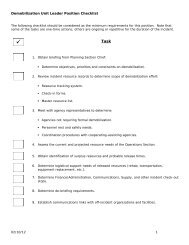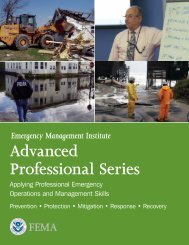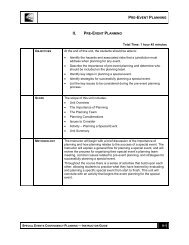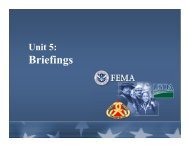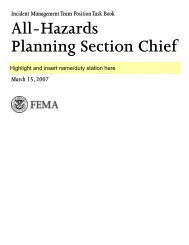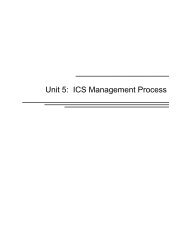enrollment for emi courses - Emergency Management Institute ...
enrollment for emi courses - Emergency Management Institute ...
enrollment for emi courses - Emergency Management Institute ...
Create successful ePaper yourself
Turn your PDF publications into a flip-book with our unique Google optimized e-Paper software.
statE/lOcal/trIbal fIElD<br />
cOursEs—prEparEDnEss<br />
& tEcHnOlOgy<br />
EmE r g E n c y ma n a g E m E n t In s t I t u t E • 2010-2011 • ca t a l o g of co u r s E s<br />
• Identify potential alternate locations suitable <strong>for</strong><br />
EOC operations should the primary EOC facility<br />
become damaged or inoperable.<br />
• Create a test, training, and exercise plan <strong>for</strong><br />
critical EOC operations.<br />
• Develop a strategy and schedule <strong>for</strong> reviewing<br />
EOC resource requirements and technology needs.<br />
Selection Criteria: This course is open to all Federal,<br />
State, local, and Tribal emergency managers; first<br />
responders to include incident commanders from all<br />
emergency management disciplines; private industry<br />
personnel responsible <strong>for</strong> coordination activities<br />
during a disaster; and Voluntary Organizations Active<br />
in Disaster (VOAD) personnel.<br />
Prerequisites:<br />
Recommended: IS 701.a, Multi-Agency Coordination<br />
System (MACS) Course.<br />
Course Length: 2 days<br />
CEUs: 1.4<br />
FEd E r A L Em E r g E N C y mA N A g E m E N T Ag E N C y 96<br />
professional Development<br />
FEMA’s Professional Development curriculum<br />
addresses skills and abilities required by the<br />
emergency management professional in today’s<br />
complex environment. Whether dealing with natural<br />
hazards, technological hazards, or national security<br />
hazards, the emergency manager must be prepared<br />
to exercise a leadership role that extends far beyond<br />
his or her own department.<br />
The field of emergency management is emerging<br />
into higher visibility in communities throughout<br />
the Nation as they are victimized by disasters that are<br />
increasingly severe and more numerous. With this<br />
comes greater responsibilities <strong>for</strong> the emergency<br />
managers, and likewise <strong>for</strong> the trainers who guide<br />
them in developing the skills to deal with disasters.<br />
managing people in Disasters: a local<br />
perspective (g249)<br />
This 3-day course is aimed at preparing participants<br />
to step in to manage and supervise in chaotic and<br />
stressful crisis situations. The package of skills offered<br />
in this course should enable an emergency manager<br />
to shift from managing a normal office environment<br />
to supervising an expanded staff in rapidly changing<br />
conditions. Major topics include communicating,<br />
community relationships, leadership, managing<br />
staff, teams, and managing the work.<br />
Selection Criteria: Anyone who per<strong>for</strong>ms emergency<br />
management work. This course applies many of<br />
the basic skills of the Professional Development<br />
Series within a disaster context, and thus offers the<br />
possibility of being given as a Capstone experience<br />
or offered as refresher modules at conferences and<br />
other functions.<br />
Prerequisites:<br />
Recommended: IS 240, Leadership and Influence, IS 241,<br />
Decision Making and Problem Solving, and IS 242, Effective<br />
Communication.



